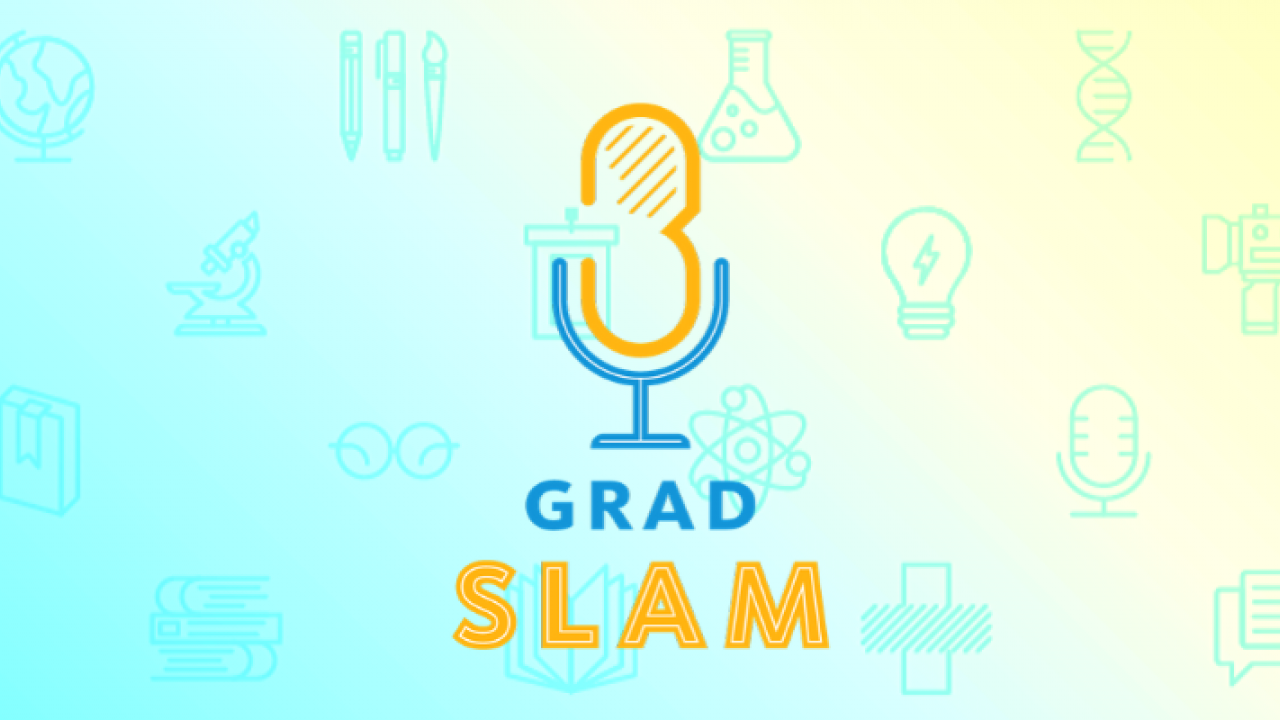
Grad Slam Finalist Profile: Horticulture and Agronomy Graduate Student Paul Kasemsap
Meet Paul Kasemsap, Horticulture & Agronomy Graduate Student and Grad Slam Finalist
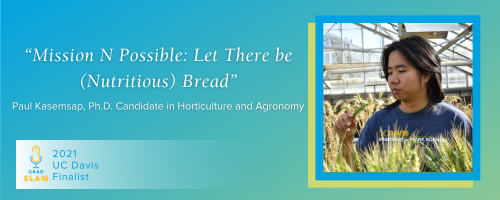
Name
Paul Kasemsap (he/him)
Program, Degree & Year of Study
Horticulture & Agronomy, Ph.D., 6th year
Research Interest
Plant Physiology (i.e. how plants turn sunlight, air, water, and dirt into food)
Previous Degrees and Colleges
B.S. in Agricultural Sciences from Kasetsart University, Thailand
M.S. in Plant Sciences from Wageningen University, Netherlands
Title of Grad Slam Presentation
Mission N Possible: Let There Be (Nutritious) Bread
Describe your presentation style in three words
Show, don't tell!
What did you do to prepare for Grad Slam?
I love talking about my research with friends and family, and then asking for feedback. This really helps me get better at being a friendly, neighborhood, science storyteller.
If you are a returning Grad Slammer, what made you want to compete again?
We have learned from history, especially in the past year, how important science is in helping us navigate through global crises. As a scientist, I aspire to be a better communicator. Grad Slam is a fun opportunity that helps bring my 'plantastic' research to a wider audience. I can't wait to share my revised talk, highlighting the need of everyone working together to mitigate climate change and ensure global food security. Thank you all for supporting sciences!
What initially attracted you to your field of study?
The Secret Life of Plants! They can't talk to us directly, so this inspires me to pay attention to how they're responding to environmental factors, like light, water, or temperature. Plus, many of them are edible and visually pleasing! Who wouldn't love plants!
Grad Slam is about presenting complex ideas for a general audience. Why would people want to learn more about your research?
My “Mission N Possible” explores how we can make wheat–a staple crop supplying a significant amount of protein and calories in human diet worldwide (those bread, pizza, noodle, pasta and more… that we’ve been enjoying)–resilient to changes in the climate system. Rising carbon dioxide (CO2) levels, as a result of human activities, prevent plants from turning soil nitrogen into protein, essentially threatening our global food and nutritional security. Across the globe, away from my home country, I am grateful for access to higher education, which has granted me opportunities to learn how food is being produced in different regions around the world. This mission at UC Davis, should we accomplish it, will answer fundamental questions on how plants make food and help sustain nutritional qualities of our major food sources in response to climate conditions anticipated in the near future.
What do you like to do in your free time?
I enjoy being outside in the sun. You will likely find me gardening, hiking, rafting, or just chilling out on grass.
Do you have any mentors who helped you develop your interest and strength in research communication? If so, how did they help you?
I owe my passion for science communication to all my teachers and mentors. Particularly, I am grateful to have been working with Dr. Arnold J. Bloom, my Ph.D. advisor. Having served as a teaching assistant in Dr. Bloom's course SAS 25 Global Climate Change at UC Davis, I was able to develop my communication skills with students from diverse backgrounds. I'd also like to acknowledge Mrs. Malin Sakdiyakorn, my elementary biology teacher, who encouraged me at the age of nine to give my first-ever official science presentation about my pet betta fish, in front of a classroom full of third-grade kids. This tiny empowerment has a life-long impact.
Where do you see yourself in 10 years?
I see myself standing outside among plants in the field (my "playground"), working with other passionate individuals, still trying to learn more about these fantastic green organisms. Understanding their secret life will help us identify and implement best practices in feeding this hungry planet.
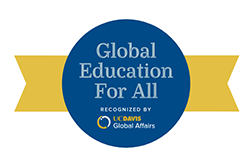
Global Education for All Recipient
Paul's presentation has received the Global Affairs' Global Education for All designation. This means the majority of selection committee members have agreed that the recipient's project: (1) helps accomplish at least one of Global Affairs' global learning goals, and/or (2) clearly addresses at least one UN Sustainable Development Goal while grappling with the complexity of doing so. The "Global Education for All" prize recognizes a Grad Slam submission that illustrates how a graduate student embraces global learning. Global learning at UC Davis is a combination of local, regional, national, and international experiences through which the student develops key skills, knowledge, and networks that help them build global awareness, engage global diversity and pursue collaborative and equitable global action. The finalists will have the opportunity to have their video showcased at the Global Learning Conference hosted by the Global Learning Hub in Global Affairs in April of this year. Learn more about this designation.
“Paul Kasemsap not only engages a critical global challenge—United Nations Sustainable Development Goal 2: Zero Hunger—but also reminds us of the human side of food and why research on sustainable practices is critical. ” - Global Affairs Selection Committee Members
Learn More About UC Davis Grad Slam Finalists
Good luck at the competition, Paul. Be sure to read all of the Grad Slam Finalist Profiles.
Watch the Final Round Virtual Competition
This year, the continuing COVID-19 pandemic has added a new video component to the already challenging public speaking event. The finalists will compete against each other at the UC Davis Final Round during National Graduate and Professional Student Appreciation Week. Cheer on the Grad Slam finalists virtually on Thursday, April 8, from 1:00 p.m. - 3:00 p.m. RSVP to reserve your spot!
The winner of the campus final round will have the opportunity to compete at the University of California-wide competition on May 7. In 2019, UC Davis champion and Plant Biology Ph.D. candidate Katie Murphy went on to win the top University of California prize of $6,000. Visit the Grad Slam website to learn more about UC Davis Grad Slam.
UC Davis Grad Slam Sponsors
Graduate Studies would like to thank this year's UC Davis Grad Slam sponsors for their generosity and support.
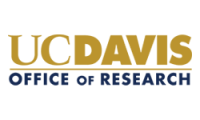
The Office of Research serves as the primary campus resource for matters related to research and technology commercialization. OR provides services and resources to simulate research, facilitate collaborations, optimize infrastructure, ensure compliance and translate innovations into commercial applications for societal benefit. Learn more by visiting the UC Davis Office of Research website.
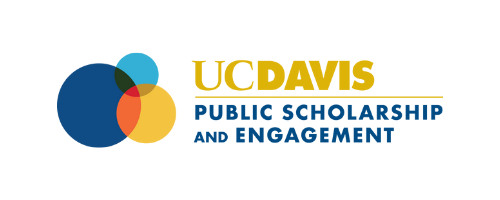
Public Scholarship and Engagement (PSE) is fostering a culture of engagement at UC Davis that increases the university’s impact through mutually-beneficial relationships that have local, regional, statewide, and global reach. We envision UC Davis research, teaching and learning that serves society and makes a positive difference in the world. Learn more by visiting the Public Scholarship and Engagement website.

Global Affairs brings the world to UC Davis, welcoming more than 10,000 international students, scholars and leaders, and hosting programs that inspire global curiosity, understanding and engagement. Compelled by the valuable outcomes of thinking globally, we make transformative opportunities a reality by supporting the thousands of students and faculty learning and researching globally—and by facilitating collaborations that tackle the world’s most pressing challenges through more than 150 global partnerships. Putting our vision of a UC Davis community that engages, thrives, and leads in this interconnected world into action, Global Affairs is in pursuit of an ambitious goal: Global Education for All.
About Graduate Studies
Graduate Studies at UC Davis includes over 100 dynamic degree programs and a diverse and interactive student body from around the world. Known for our state-of-the-art research facilities, productive laboratories and progressive spirit – UC Davis offers collaborative and interdisciplinary curricula through graduate groups and designated emphasis options, bringing students and faculty of different academic disciplines together to address real-world challenges.
UC Davis graduate students and postdoctoral scholars become leaders in their fields: researchers, teachers, politicians, mentors and entrepreneurs. They go on to guide, define and impact change within our global community.
For information on Graduate Studies’ current strategic initiatives, visit the Graduate Studies strategic plan page.
